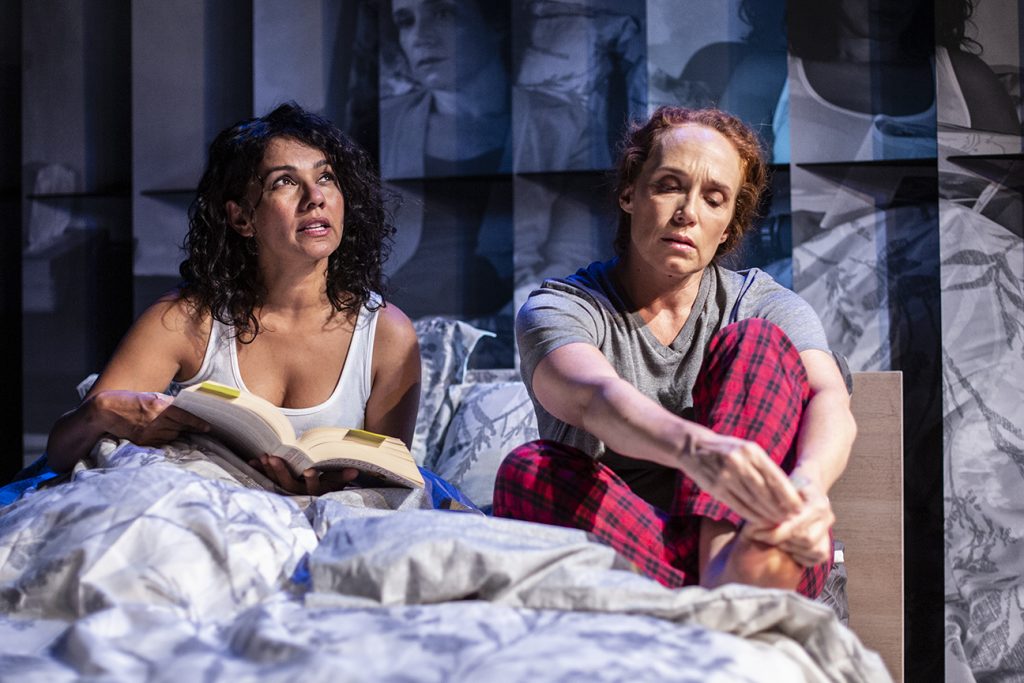
Credit: Shimon Photo
At Studio 16 until October 20, 2019
Tickets from $14 (2 for 1 Tuesdays) at mitchandmurrayproductions.com
Posted October 13, 2019
Mitch and Murray Productions strikes again with the thought-provoking, smart, relevant and very funny Body Awareness. We talked about it in the theatre after the show until the doors were closing; we talked about it on street outside the theatre; I thought about it all the way home; and I raised the questions playwright Annie Baker poses in this four-hander at our Thanksgiving Dinner family gathering the next day. The inter-generational discussion was illuminating. The male gaze? Does it still dominate the visual arts and the way men present women and the way women present themselves? This was a burning issue in my 20 and 30s. But have we really come a long way, baby?
Joyce (Jennifer Copping) and Phyllis (Suleka Mathew) are a lesbian couple sharing their Shirley, Vermont apartment with Jared (Zac Scott), Joyce’s 21-year-old son from a previous heterosexual marriage. There are obvious tensions: Phyllis, a psych prof in a local college, patronizes Joyce, a cultural studies highschool teacher. Joyce challenges Phyllis’s passionately, sometimes rapidly held feminist views on occasion but Joyce is always the one to make peace. And Jared may or may not have Asperger’s syndrome but, clearly, something is off-kilter. A self-described “autodidact”, he is completely absorbed with the Oxford English dictionary and carries it around much the way a toddler carries a blanket. Refusing to believe he has Asperger’s, Jared will not agree to counselling. Periodically he lashes out at his mother, threatening – at one point – to kill her. “I don’t have it [Asperger’s]”, he shouts. There’s nothing in the play to suggest that he has had years and years of visits to psychiatrists but it’s safe to assume that’s the case. His mother, is after all, an educator and she loves him. But at twenty-one, big and strong, Jared cannot be forced into therapy.
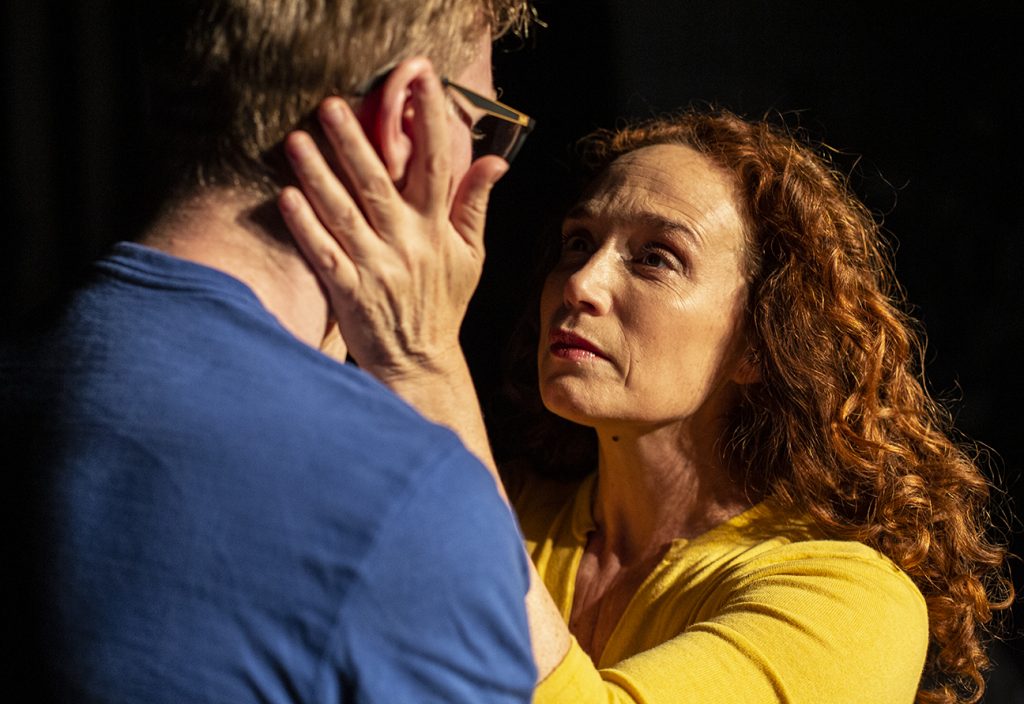
Credit: Shimon Photo
This is a family trying hard to keep it together.
Enter Frank (John Murphy), a photographer and billeted houseguest, who has an exhibit of his photographs at the college where Phyllis teaches and where she’s hosting a Body Awareness Week. An outspoken feminist, Phyllis is outraged that his photos are all of naked women and without even seeing his images, she charges him with being a pervert who objectifies and exploits women. It doesn’t help that Joyce and Jared like him. He’s funny and he’s a diversion.
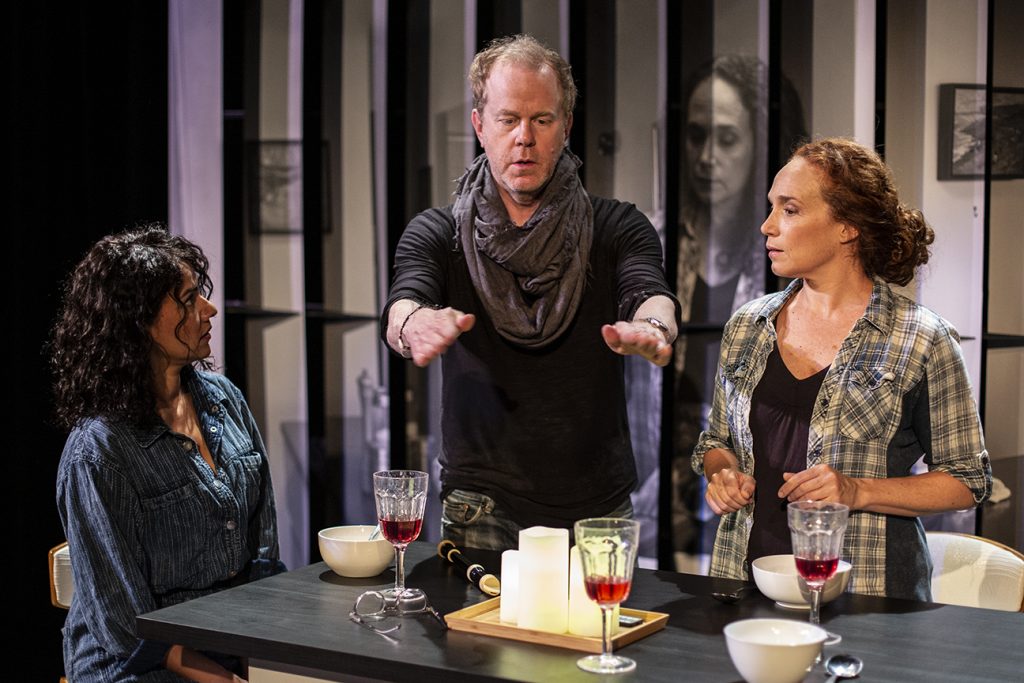
Credit: Shimon Photo
It’s an interesting setup that unrolls on David Roberts’ superb set: stage right is a bed and duvet behind which is a larger-than-life, b/w photo of Phyllis and Joyce in that very bed under that very duvet. The photo is mounted on tall, slightly angled, vertical louvres which, although they don’t move, allow for very interesting lighting effects (by Celeste English). Stage left is Phyllis and Joyce’s kitchen with a similar b/w, louvred photo of Joyce at the kitchen counter and Jared seated a few feet away. It’s clean, it’s modern and it’s a great frame for action that happens in the bedroom and in the kitchen.
Baker’s script is sparkling and sometimes hilarious – often because of Jared’s off-the-wall, unfiltered comments. When Joyce tells Frank they don’t drink wine, for example, Jared says, “We drink our own urine.” Or, later, “I’m gonna get a girlfriend and have doggie-style sex with her.”
At Joyce’s urging, Frank – who clearly thinks he has a way with women – establishes a buddy-buddy relationship with Jared who is eager to be rid of his virginity. Frank’s advice: first the kissing, then the breast, stomach and finally “the crotch”. He suggests “eating out” a woman first to which Jared responds, “What if I’m grossed out?” “Oh, don’t be a baby”, snorts Frank derisively.
Frank may be a sleazebag but John Murphy is so skilled we are amused rather than disgusted by his comments. When Jared confesses to Frank he’s worried that he might be “a retard”, Frank dismisses Jared’s fears with, “You’re not retarded. You’re living with two women.” Case closed. Coming from Murphy, it sounds funny.
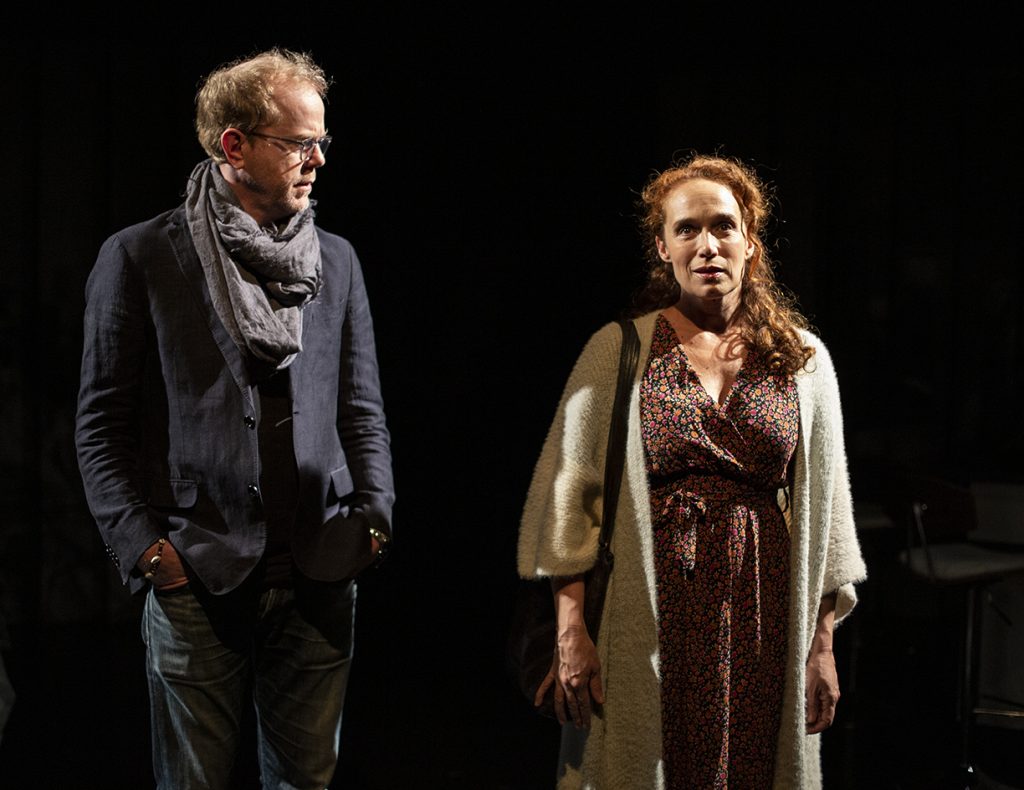
Credit: Shimon Photo
Phyllis’s domination of Joyce and her immediate dislike of Frank make this character initially unappealing despite the big smile and even bigger enthusiasm so Suleka Mathew has an uphill climb. What we eventually begin to suspect is that Phyllis has something in her past that has resulted in what appears to be mistrust of men like Frank – or maybe all men. Showing Phyllis’s vulnerability, Mathew wins us over and that big smile becomes authentic.
Jennifer Copping makes Joyce such a vulnerable mess – and with every right to be one – that she has us onside with Joyce from the start. And when she stands up to Phyllis we wholeheartedly approve. You go, girl.
Zac Scott is wholly committed to his character: Jared’s body language, strange outbursts, scary threats of violence and sadly thwarted adulthood.
Three of these characters make important shifts in self-awareness by the end of the play.
In an interview with the playwright, Annie Baker said, “My goal for the play is to not judge anyone, to get at that point where everyone is equally right and equally wrong, so the humor comes from that… I wanted to write a play about issues that wasn’t an ‘issue play’.”
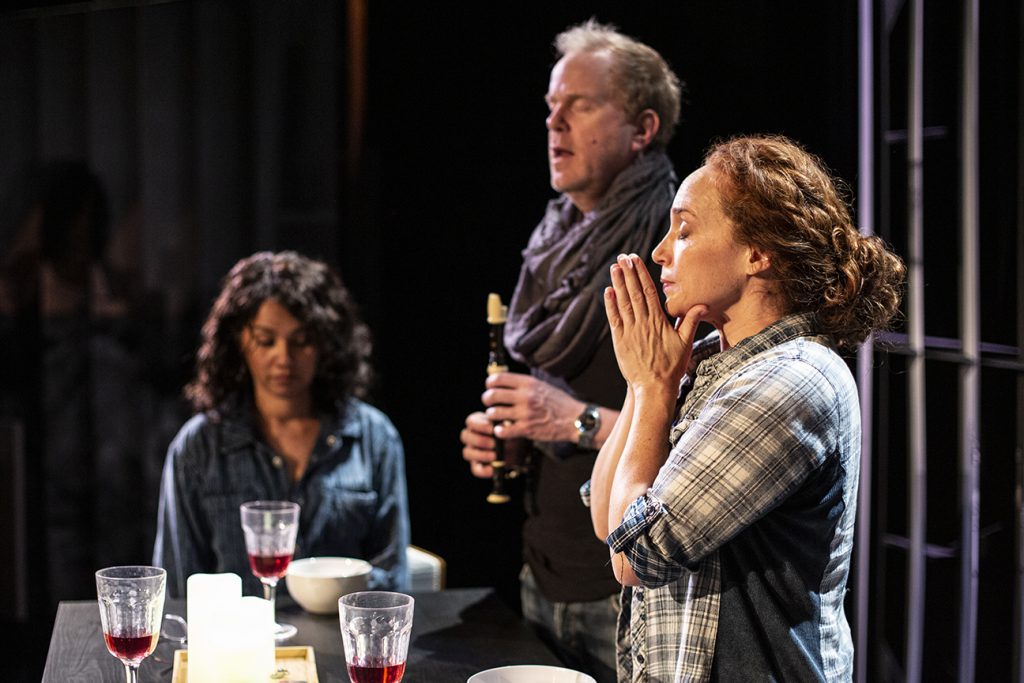
Credit: Shimon Photo
But interestingly, my continuing thoughts about the play are about the issues, especially ‘the male gaze’ about which so much has been written, especially Laura Mulvey’s essay “Visual Pleasure and Narrative Cinema”. I’m content that the story of Joyce, Phyllis, Jared and Frank got me re-examining where we are now vis-à-vis the objectification of women. What is the billion dollar cosmetic industry really all about? For whom do women make themselves beautiful? And who defines beauty? The young adults in my life say they think about it and talk about it all the time.
Under Aaron Craven’s excellent direction, Body Awareness got me thinking about it all over again. I respect a theatre company that consistently recharges my batteries.

